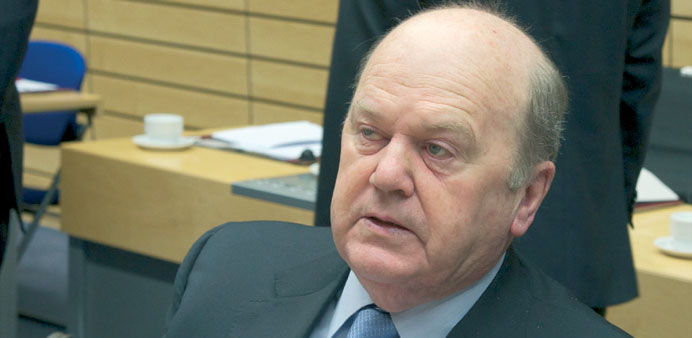“Dark picture” calls for bold policies, says the EU report; Study was the basis for the ongoing Dublin talks
|
|
The European Union’s economic growth strategy has been a failure so far and unless bold steps are taken the economy will continue to stagnate, a study commissioned by EU finance ministers said.
The paper by Brussels-based Bruegel think-tank scholars Zsolt Darvas, Jean Pisani-Ferry and Guntram Wolff was the basis of discussions on the future of growth in Europe among the 27 EU finance ministers this week at informal talks in Dublin.
“Much of Europe suffers from a mutually reinforcing interaction between limited productivity gains, protracted deleveraging, weak banking sectors and distorted relative prices,” the Bruegel study said.
“This combination contributes to an overall weakening of economic growth and threatens to turn into self-perpetuating stagnation. This dark picture calls for bold policy action significantly beyond what is currently being undertaken,” it said.
The paper said that while 30 years ago, the output of the countries that formed the European Union until its 2004 expansion was 15% higher than that of the US, it is likely to be 17% lower in 2017.
This is because productivity in Europe has been falling since 2007, labour markets are inflexible and slow to react to the economic cycle and the economy was more focused on imitation than innovation, among other reasons.
The 17 countries that use the euro were in recession last year and will contract further this year, mainly as a result of the sovereign debt crisis.
The study said that to get Europe growing again, policy-makers should focus on credit, investment and growth because without these any structural reform would be rejected by voters, as would budget deficit cuts, unless they deliver results.
Irish Finance Minister Michael Noonan, who chaired the talks, said the study triggered a “very positive discussion”.
For growth and productivity to rise, the financial sector in Europe had to be fully functional and that could only happen if banks acknowledged bad loans and governments strengthened the banks, the Bruegel study said.
“Europe for too long refused to recognise it,” the paper said, noting that the takeover of bank supervision in the eurozone by the European Central Bank was a unique chance to complete the overhaul of the banking system.
“Before the ECB carries out the ‘comprehensive assessment’ of the banks brought under its supervision, national authorities should trigger a recapitalisation of undercapitalised banks and a resolution of the insolvent ones,” the paper said.
To give governments an incentive to recapitalise banks the European Commission should make clear it would disregard until the end of this year the costs of such operations as one-offs in its assessment of budget deficit reductions required by EU law.
The study said one way to boost growth would be to establish a eurozone banking union. Apart from single bank supervision, this would create a unified way for the euro to wind down banks and finance such operations.
“Banks that have passed the ECB’s comprehensive assessment should fall under the banking union and become truly European banks with clearly defined burden sharing arrangements,” the study said.
Governments also should gear budget deficit cuts to the performance of their economies. Instead of deep deficit cuts, which could further slow growth, governments could undertake pension reforms to consolidate public finances, it said.
Another way to help growth would be to subsidise credit to small- and medium-sized companies (SMEs).
“As banks may choose not to lend to SMEs because loans are subject to significant haircuts when taken as collateral in central bank repo operations, there is a case for providing support to the enhancement of this collateral,” the paper said.
“The ECB cannot carry that fiscal risk. Instead, the EU should explore temporary collateral enhancement schemes, for example, in liaison with the European Investment Bank,” it said.

